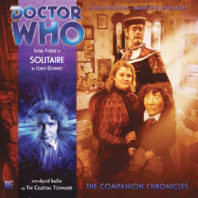
Released June 2010
In a fourth series that has continued to shatter any perceived boundaries of The Companion Chronicles by highlighting the Fifth and Sixth Doctor eras while continuing to toy with framing device formats and even bringing in multiple companions on two occasions, John Dorney’s ‘Solitaire’ arrives as what may be the most ground-breaking entry yet, dropping the narration aspect completely and featuring a complete two-hander with Eighth Doctor companion Charlotte Pollard in the spotlight. Arriving in a toyshop with no memory of who or where she is, Charley soon finds herself embroiled in the Celestial Toymaker’s dangerous sense of play, but with the Doctor gone and the TARDIS lost, the rules are anything but set as the game begins anew.
Despite Charley’s protestations, the Toymaker rightly claims that nobody is too old for games, and Charley looking to win a game she knows none of the rules to in order to avoid being turned into a doll like so many before her provides a fitting metaphor for the daily challenges the unknowns of living and succeeding in life present. The Toymaker is quick to point out that not all game rules make sense while Charley insists that the answers must be obvious in front of her to give her a fighting chance, but the intensified consequence that this sentient game adds by shrinking the playing room by ten percent at set time intervals and in response to incorrect moves is a fascinating one that excellently intensifies the overall sense of intensifying danger.
Even with Charley suffering from amnesia, it’s quite amazing just how easily India Fisher recaptures her earlier stylings as the self-titled Edwardian Adventuress while also bringing the greater nuance she would come to master in her continuing journeys. Set free from the emotions that began to weigh on her at this time alongside the Eighth Doctor, this is Charley at her most intelligent and impulsive, confident she can use the information in front of her to find a means of escape. The Toymaker points out her inherent naivety and revels in her decision to unknowingly sacrifice the Doctor to test out one theory given his own prior failures against the Doctor, but his own egotism and conceit is brilliantly shown as Charley comes to realise that the Toymaker is, in fact, likewise an unwitting participant who is just as much in the dark about the objectives and rules as she is. The distinctly opposite paths these characters undertake unfold with perfect pacing, and David Bailie gives a powerful performance that matches Fisher’s in every respect to create one of the most engrossing entries in this range to date.
With nothing truly what it seems and established facts anything but, ‘Solitaire’ is an immensely rewarding puzzle that is much more complex than its simple premise suggests. Every revelation is earned and, befitting of the Toymaker’s early suggestion that results must be based on known quantities even when the truth is obscured, the end result comes together logically and cohesively to accentuate the simplicity of the answers and to squeeze the absolute most out of this very small environment. Two-handers are incredibly difficult to write and deliver in a manner that demands attention throughout and that maintains pace and atmosphere, but ‘Solitaire’ is a brilliant example that provides yet another example of just how stellar the stories of Doctor Who can be even when the Doctor himself is not present even if in this case his very essence proves so integral to Charley’s escape from the dangerous man who fittingly refuses to bear witness to her very earned victory.
- Release Date: 6/2010


Leave a Reply